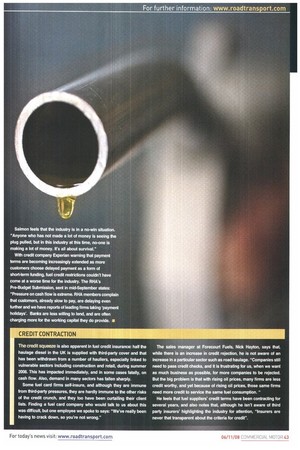CREDIT CONTRACTION
Page 43

If you've noticed an error in this article please click here to report it so we can fix it.
The credit squeeze is also apparent in fuel credit insurance: half the haulage diesel in the UK is supplied with third-party cover and that has been withdrawn from a number of hauliers, especially linked to vulnerable sectors including construction and retail, during summer 2008. This has impacted immediately, and in some cases fatally, on cash flow. Also, demand in many sectors has fallen sharply.
Some fuel card firms self-insure, and although they are immune from third-party pressures, they are hardly immune to the other risks of the credit crunch, and they too have been curtailing their client lists. Finding a fuel card company who would talk to us about this was difficult, but one employee we spoke to says: "We've really been having to crack down, so you're not wrong." The sales manager at Forecourt Fuels, Nick Hayton, says that, while there is an increase in credit rejection, he is not aware of an increase in a particular sector such as road haulage. "Companies still need to pass credit checks, and ills frustrating for us, when we want as much business as possible, for more companies to be rejected. But the big problem is that with rising oil prices, many firms are less credit worthy. and yet because of rising oil prices, those same firms need more credit to service the same fuel consumption. "
He feels that fuel suppliers' credit terms have been contracting for several years, and also notes that, although he isn't aware of third party insurers' highlighting the industry for attention, "Insurers are never that transparent about the criteria for credit".




























































































































































